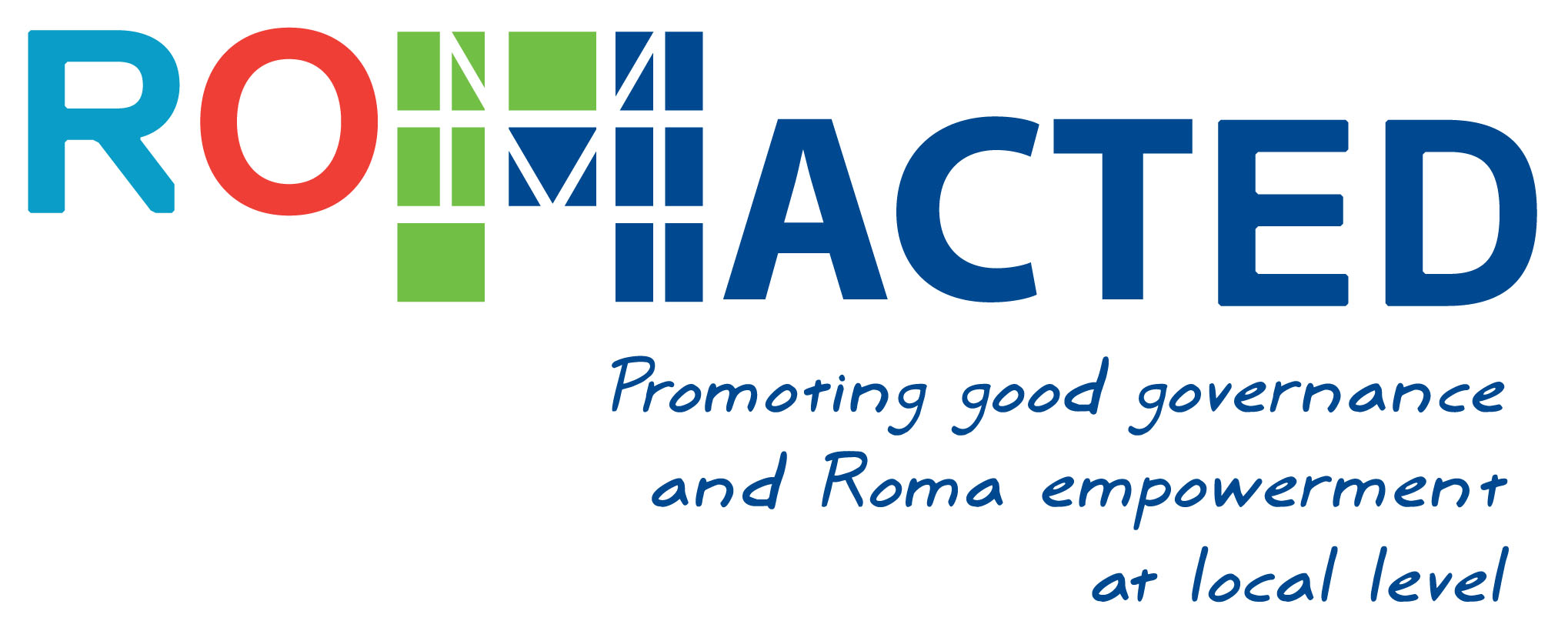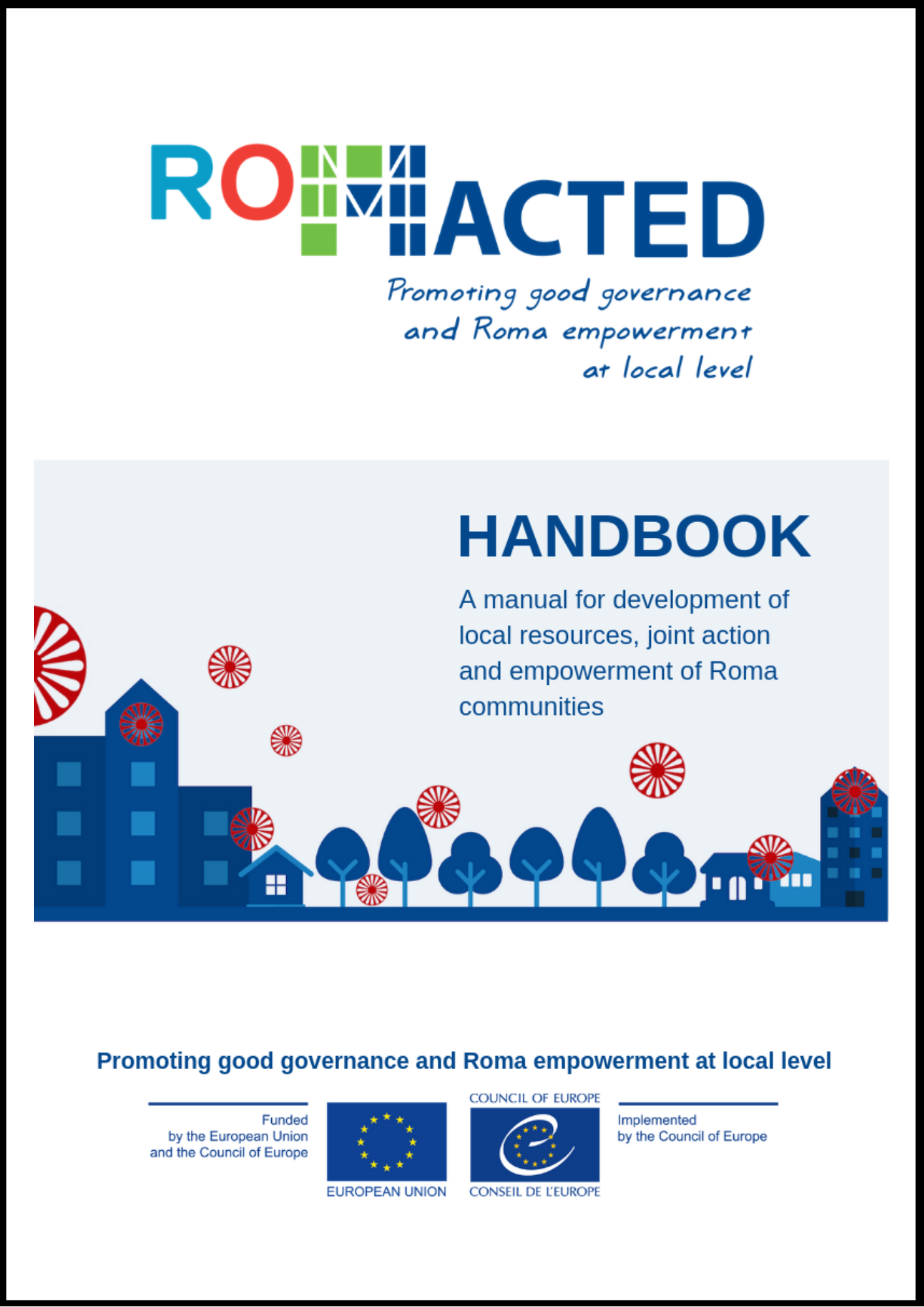About ROMACTED Programme
ROMACTED results from the experience of the ROMED and ROMACT programmes and will reflect upon the adaptation of these methodologies and activities to each beneficiary and selected location, in order to fit into the policy cycle and the dynamics and reality of each municipality, and thus bringing an additional input to existing policies and practices for an effective and more inclusive functioning.
One of the leading guidelines in the methodology of the programme is that participation in local governance can only be effective if it is context-appropriate. Thus, a preliminary mapping, assessment, baseline survey and research are done in each selected municipality so as to facilitate the adaptation of the programme and its support and monitoring of the process.
ROMACTED, “Promoting good governance and Roma empowerment at local level”, is a Joint Programme between the European Union (DG NEAR) and the Council of Europe.
The programme is implemented by the Council of Europe’s Roma and Travellers Team and the Office of the Directorate General of Programmes in Albania, Bosnia and Herzegovina, Kosovo*, Montenegro, North Macedonia, Serbia, and Türkiye.
Phase I of the Programme was implemented for the period starting from 1 May 2017 until 31 December 2020. Phase II is implemented from 1 January 2021 until 31 December 2024.
In addition to the Strasbourg-based team, the programme has project staff in the Council of Europe offices in Albania, Bosnia and Herzegovina, Montenegro, North Macedonia, Serbia, Türkiye and Kosovo*, and a national support team in each of the Beneficiaries.
The aims of the programme
The project pursues the following objectives: improving local democracy, accountability, inclusiveness and responsiveness towards Roma citizens and thereby improved delivery of services.
The Programme is designed to build up political will and sustained policy engagement of local authorities, to enhance democratic local governance and to build up capacity and stimulate the empowerment of local Roma communities to contribute to the design, implementation and monitoring of plans and projects concerning them through the following outcomes:
- empowering Roma community - on the individual level (assisting people to practice their basic rights and to expand their capacity and skills), as well as on the community level (assisting people to get organised to voice out their interests around community problem solving;
- improving and expanding the institutions’ commitment, capacities, knowledge and skills in working for Roma inclusion, putting in practice the concepts of good governance;
- contributing to the preparation of the local development actions that aim to improve the quality of life for Roma and to reduce the gap between Roma and non-Roma, including in relation to mitigating the effects of the COVID-19 pandemic.
 Actions
Actions
The specificity of the actions would be to assist the local authorities to integrate Roma specific dimension/measures into the mainstream local policies, budgets and public service delivery on their agenda, while enhancing the participation of the Roma citizens in the design, implementation and monitoring of those policies and projects. As a result of the implementation of the programme, it is expected that the participating municipalities remain with consolidated features to continue serving the needs of the Roma population such as sustainable local action plans and one-stop-shops that facilitate the access of Roma to the public services.
 Target groups
Target groups
The target groups are local public administrations (the elected representatives and relevant officials) and the Roma communities from the selected municipalities. They are also the first short-term beneficiary groups of the project. Overall, the project will target 70 municipalities. The mid- to long-term beneficiaries are the Roma population and the population of the municipality in general.
 Activities
Activities
Roma Responisve Budgeting at Local Level
The current situation is characterised in many locations by lack of capacity at local level to implement or to comprehend the essential importance of the Roma sensitive/responsive budgeting measures and an unequal and unfair distribution of community resources by disfavouring Roma, especially in the time of natural disasters, pandemic and/or financial crisis.
ROMACTED Phase II will continue building the capacities of municipal staff on the needs and benefits of Roma-responsive budgeting with the aim of ensuring that municipal budgets are developed accordingly. Concrete envisaged actions include producing and disseminating Guidelines on Roma-Responsive Budgeting and advocating that Joint Action Plans include the allocation of relevant budgetary resources.
Synergies with other relevant stakeholders on the ground are of utmost importance. In particular, ROMACTED Phase II will use all the available external resources in its activities in this regard in order to avoid duplication of work and to contribute jointly with other stakeholders to the overall improvement of the performance of the local authorities with regard to applying Roma-responsive budgeting.
The best practices will be shared among Beneficiaries wherever applicable, taking into consideration the diversity of the local contexts in which ROMACTED Phase II is being implemented.
Learn more about Phase I experience on Roma and Egyptian Responsive Budgeting at Local Level in Albania.
Re-Integration of Roma Reurnees
ROMACTED Phase II Programme participates in the efforts relating to the integration of Roma returnees coming back to the region from the EU in particular. Part of this work is being done in close co-operation with the project carried out by UNDP and World Bank also funded by the EU/IPA II.
ROMACTED Phase II will continue to apply the human-rights approach when it comes to returnees, ensuring that they are included in all the existing mechanisms at the local level. For example, challenges encountered by Roma returnees will be taken into consideration when developing a priority list based on community assessments, representatives of Roma returnees will be included in the Community Action Groups, etc.
One of the challenges identified during Phase I was the urgent need of effective returnee reintegration policies that respond effectively to the needs of vulnerable Roma returnees. Additionally, available data indicate that different policies and legislation relevant for Roma returnees represent a challenge in efforts to use best practices from different Beneficiaries and different municipalities, but sharing information within the Programme, as well as with UNDP and World Bank, remains the top priority for the Programme.
Post-COVID Recovery Measures
Phase II (2021 - 2024) was designed in such a way to provide a more systematic response to the impact of COVID-19 in the Roma communities. So far, the available data indicate that the consequences of the pandemic affected Roma communities and other marginalised groups more negatively than the rest of the population in all segments, including in education and other socio-economic segments, access to information on vaccinations, etc. Challenges identified during the pandemic include the increased vulnerability in the Roma communities that generates additional social challenges such as unemployment, loss of earnings and other forms of livelihood, housing and property degradation, disruptions in access to healthcare and education, etc.
These challenges are being addressed through Phase II, during which it is envisaged to develop support actions and measures to build the structural capacity of the local communities and authorities to mitigate the impact of the crisis and foster the post COVID-19 recovery. At the same time, one of the specific objectives of ROMACTED II is to contribute to the preparation of the local development actions that aim to improve the quality of life for Roma and to reduce the gap between Roma and non-Roma, including in relation to mitigating the effects of the COVID-19 pandemic. In terms of concrete estimated results, concrete measures and plans are established to reduce the negative impact of the COVID-19 crisis in the Roma communities.
*This designation is without prejudice to positions on status, and is in line with UNSCR 1244/1999 and the ICJ Opinion on the Kosovo Declaration of Independence.
For additional information regarding the ROMACTED Programme, please contact us.


